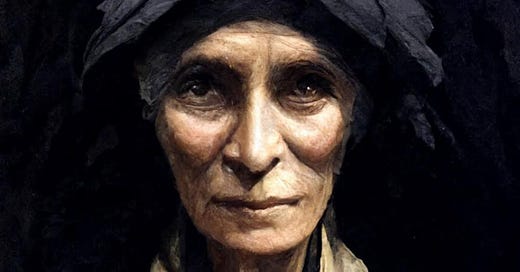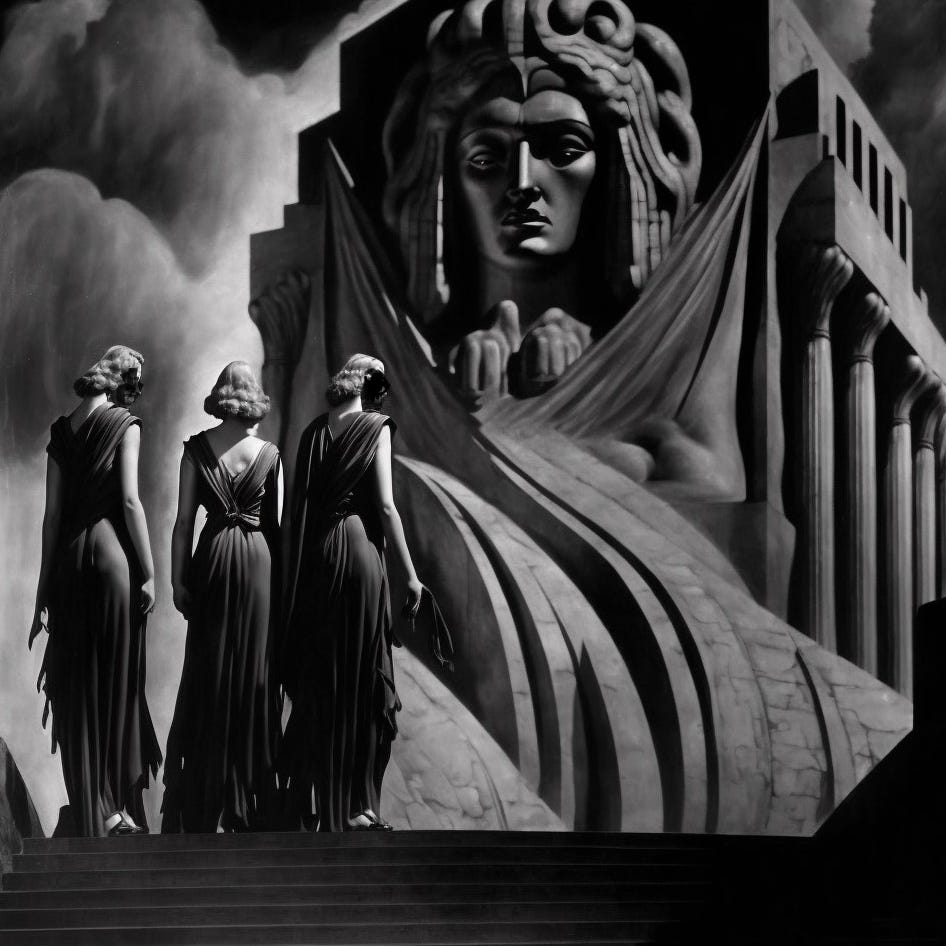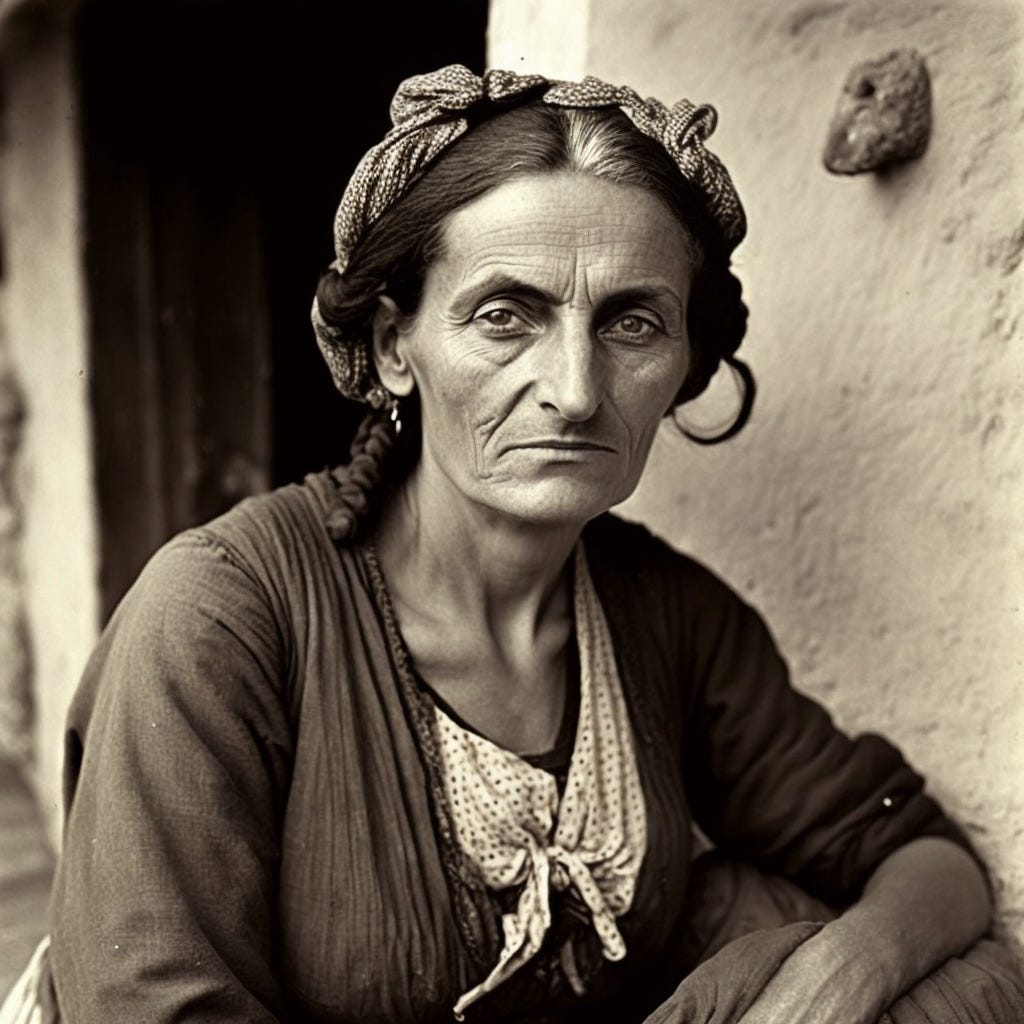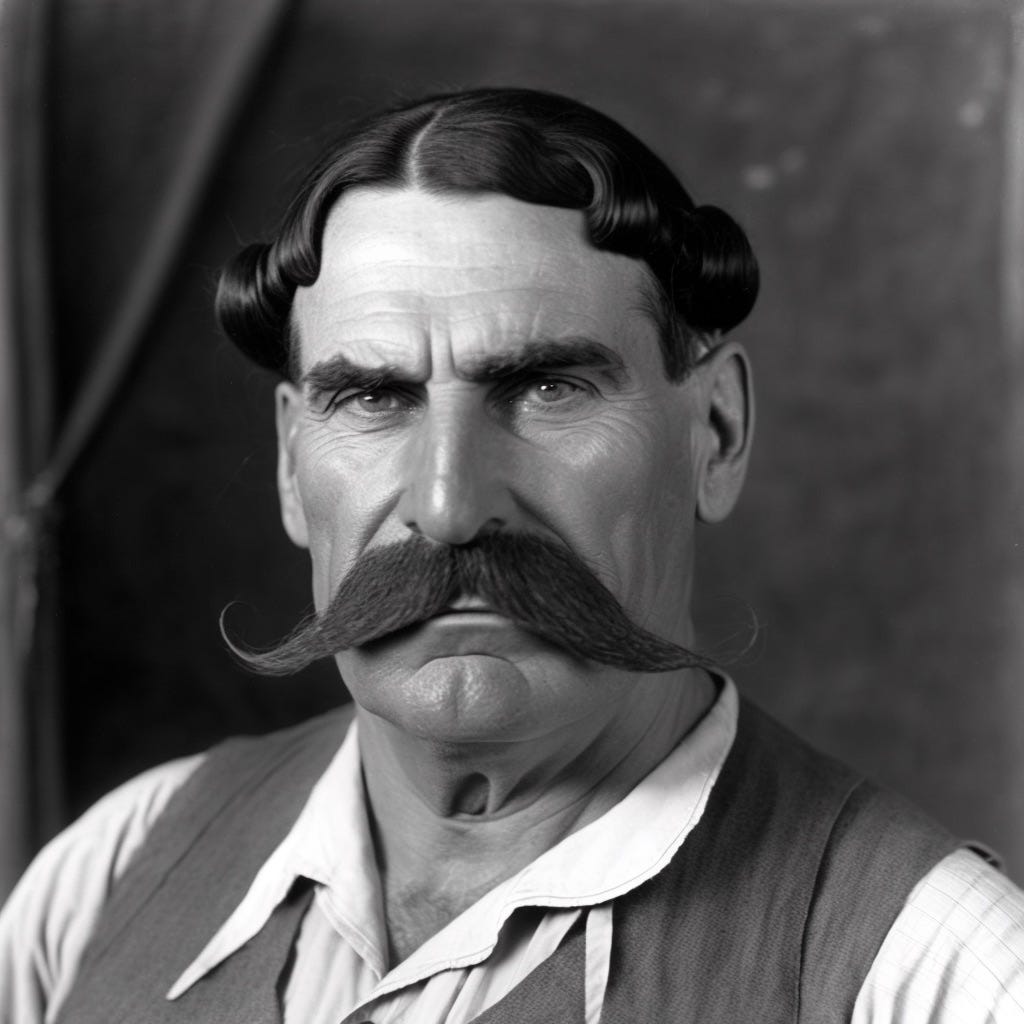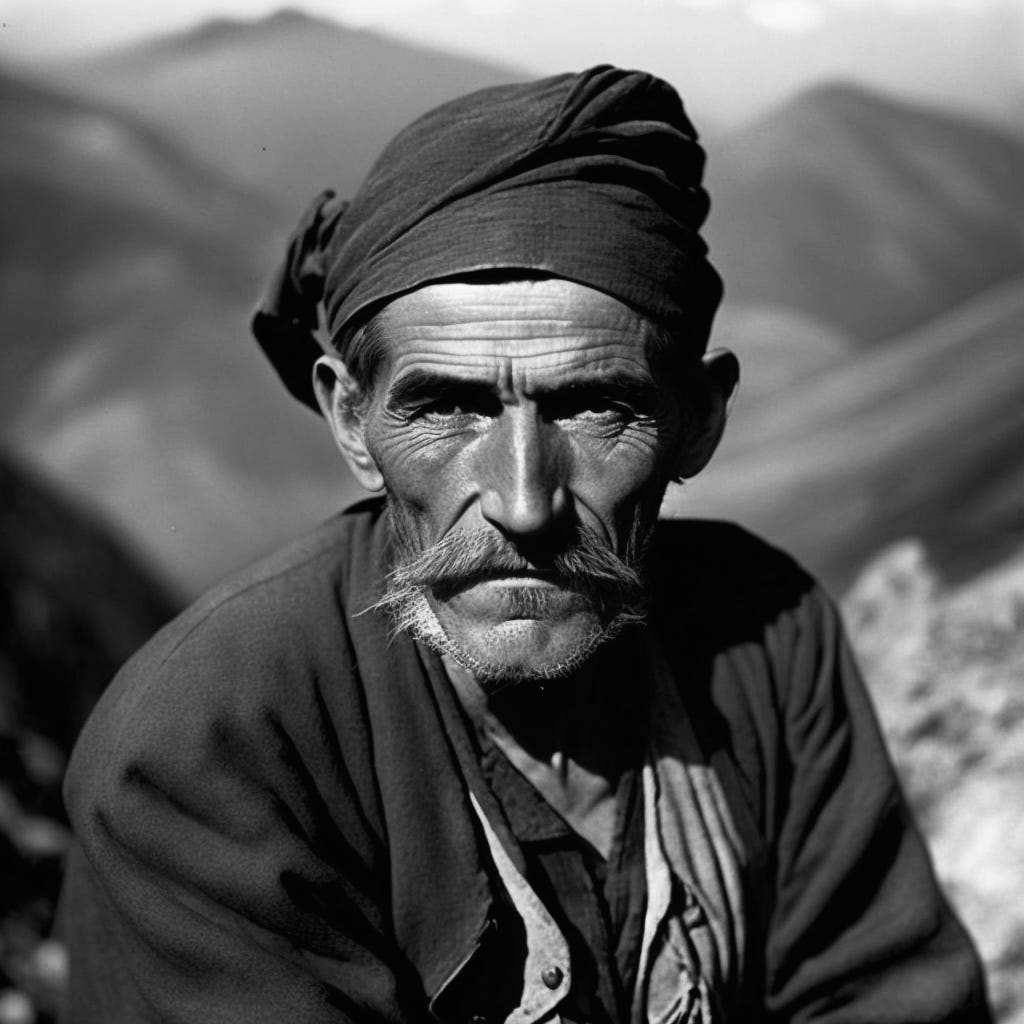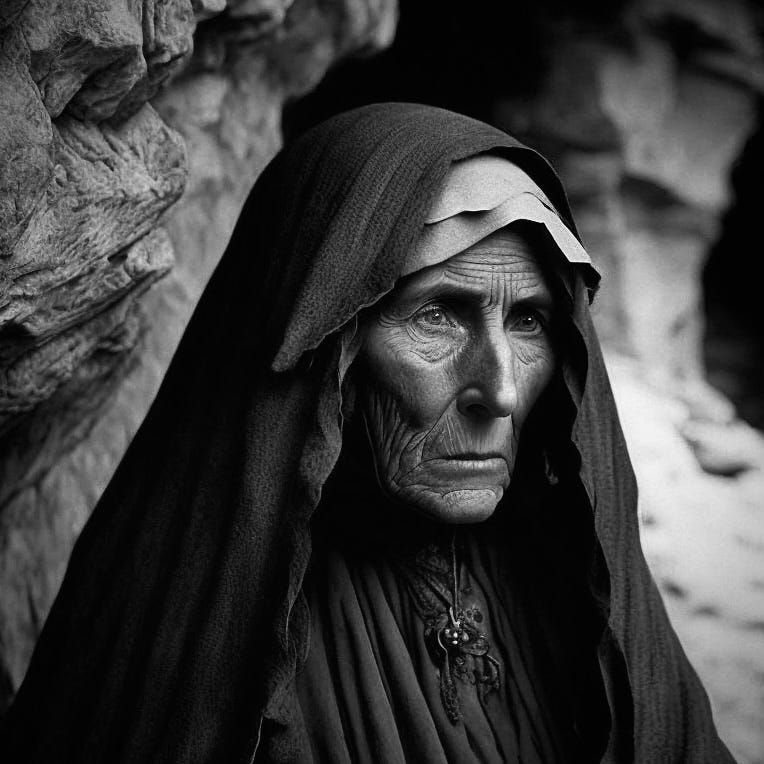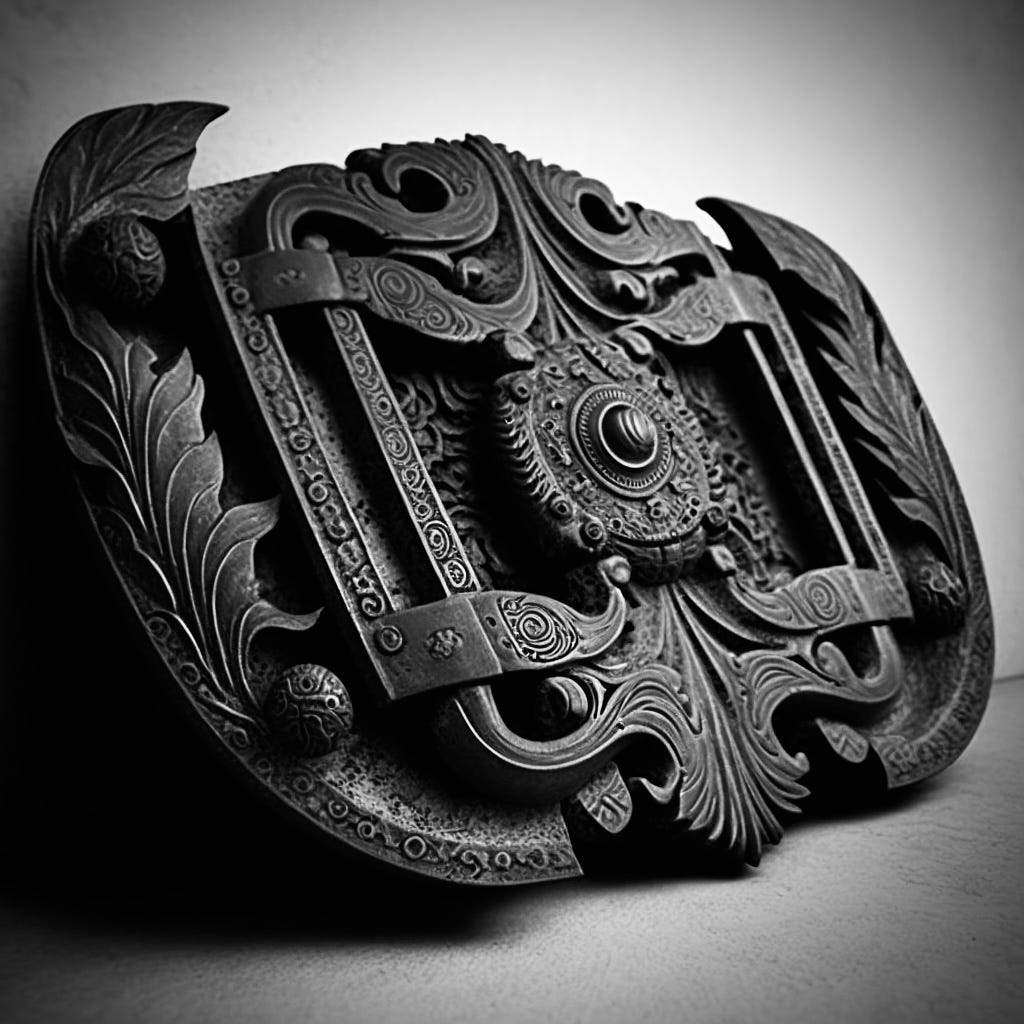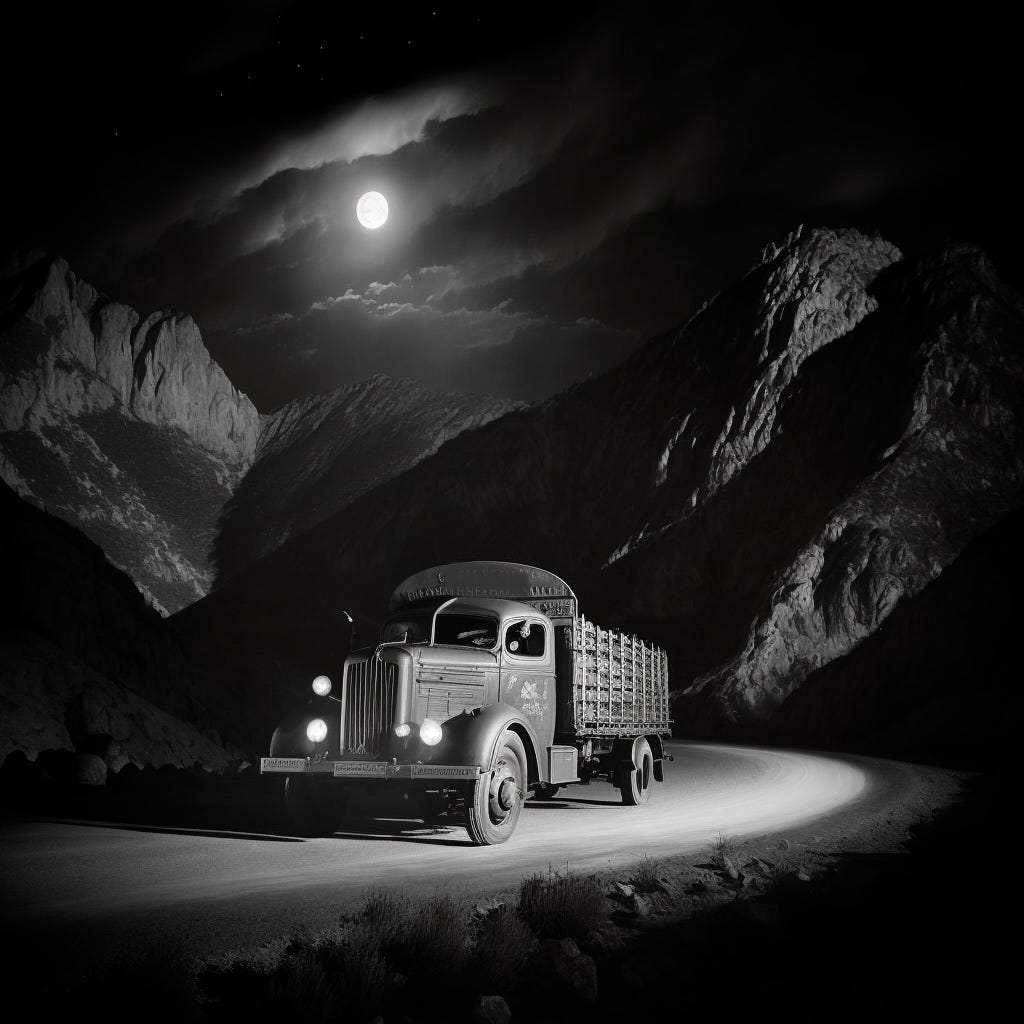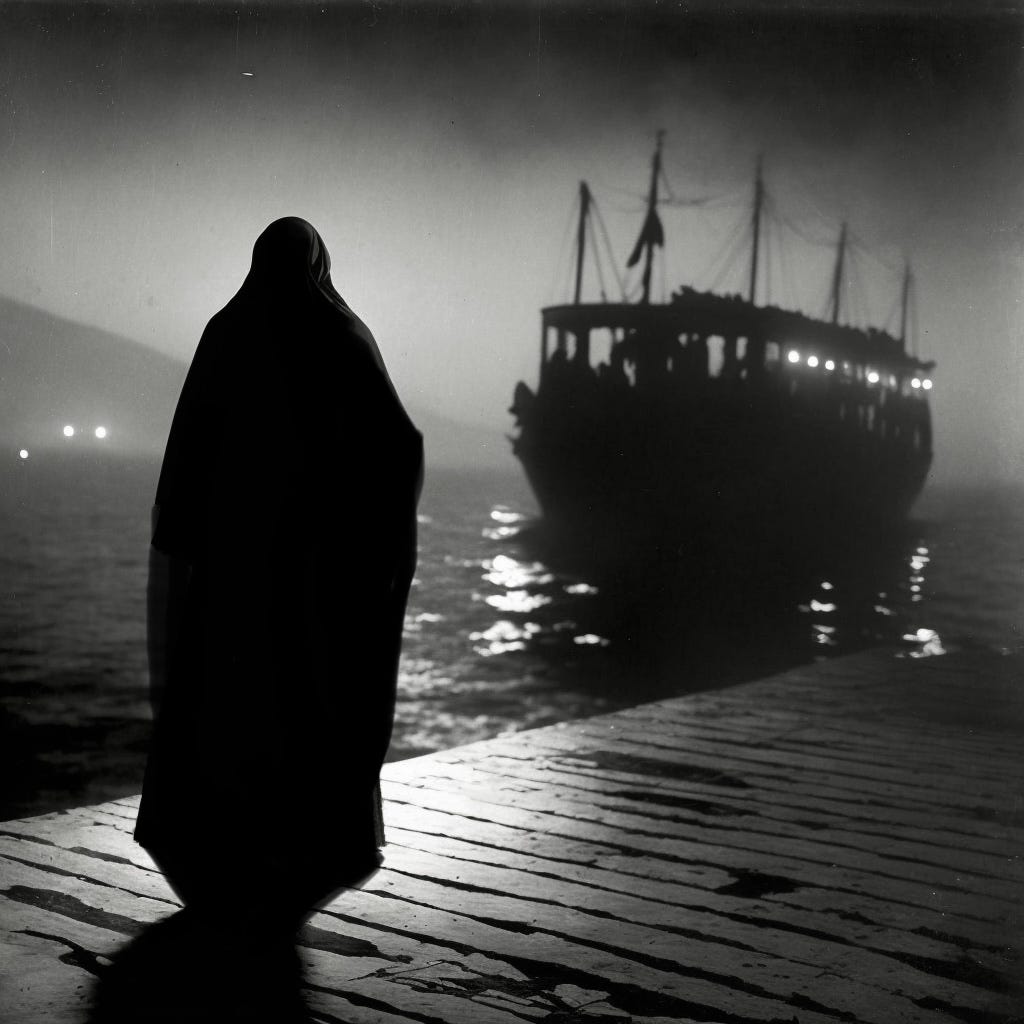
Macbeth: How now you secret, black, and midnight hags. What is’t you do? Witches: A deed without a name. (Macbeth IV.1)
Chapter 8: Götterdämmerung
Thekla dreamed she was on the set of one of Koebner’s films in an Art Deco temple. Three veiled women whose backs were turned to her stood side by side at the top of a set of marble steps. A sphinx-like face carved into the temple’s wall loomed over all. Even though Thekla was in a studio in Berlin, the wind that beat against her face was due to the temple’s location, situated as it was on an open hill in the woods of Dodona.
The doves circling overhead were real, except for the black dove, Queen Hecate, who had been converted by a taxidermist into a prop and dangled from a pole, which Manolios, the boy with the cleft lip, operated like a puppeteer. Thekla looked away from Manolios, because she had caused him grief and distress. He glowered at her balefully—as did Queen Hecate, who was very much alive and flapping her wings in an effort to disentangle herself from the strings and hooks that bound her.
Thekla and the three women raised their arms in homage to the stone face, the eyes of which opened slowly as a soprano sang the verse “Rest now, O God” from Brünnhilde's immolation scene from Wagner’s Twilight of the Gods.
The sphinx-like face was slathered in greasepaint, a trick of the camera. The eyes opened and Thekla saw that the actor was Günther! There was a rumble of stage thunder as his head fell from the temple frieze and crashed to the ground. It transformed from a disc to a round stone and rolled down the steps. The three women glanced over their shoulders at Thekla. Their veils blew in the wind but never lifted to reveal their faces. The rolling head shrank as it crashed down the steps, shattering the marble surfaces it fell upon.
Thekla heard Koebner laughing behind her as the camera’s rat-tat-tat became more frenetic and blended with the flapping of the birds’ wings. His laughter was so raucous that Thekla wheeled around to rebuke him. The camera rolled on its own accord. The director had gouged out his eyeballs and was chewing them lustily, giggling like a nincompoop in one of his low comedies.
Günther’s severed head struck Thekla’s feet. The head gazed up at her, gasping like a fish out of water. . .
Thekla woke with a start and sat up in bed, startling old Agatha who’d been snoozing in a chair beside her. Uncle Spiro had told Agatha to stay with the half German, half Greek woman in case she took a turn for the worse.
Thekla realized it was dawn because she heard the Albanians reciting their morning prayers. Not to be outdone, Papa Nikolaos emerged from the Church of the Dormition of the Mother of God shortly thereafter and began striking a large wooden bell to signify that the Sabbath had begun.
“I need a few more hours,” Thekla said. She fell asleep again.
The witch in the mountain pass stood under the oak tree by the cave. The bronze fragments dangling from the branch overarching the cave’s mouth chimed in the dawn breeze. The old woman touched her cheek with one hand as if bewildered by the strange echo coming from inside the cave. A boulder rolled impossibly out of it and over the roots of the oak tree. When it came to a stop, the old hag hiked up the skirts of her black robe and pissed on it. With an acidic hiss, the bloody urine washed away the petrified face of Günther Rippenberg.
It was late in the morning woke again. Agatha was no longer in the room. Thekla had slept for over fifteen hours. She felt refreshed. It was as though the nightmare had shaken her out of her delirious lassitude. She heard the woman who had tended to her last night talking with their host, Uncle Spiro, downstairs. The medicinal salve that Agatha had used on Thekla’s arms was dry and brittle. Thekla washed it off in the ceramic basin. There was no plumbing in the mansion.
She put on a gray blouse with long sleeves and donned a pair of dungarees. She decided to forgo her steel-rimmed glasses. She didn’t need them: a senseless affectation at this point. She left the room and went to the top of the landing.
The three Albanian Muslims from the raft were carrying crates out of the mansion. The large woman, Dorcas, was holding open the door. Koebner was flailing his arms and speaking rapidly to Uncle Spiro, who kept nodding gravely as if he understood what the film director was saying. Agatha, who was smoking her clay pipe, seemed disinterested but offered a suggestions to Uncle Spiro as to what she thought Koebner was trying to say.
The assembly downstairs went silent when the floorboards on the upper landing creaked. They looked up. The commotion resumed.
“Ah!” Koebner said. “Thank goodness. Are you strong enough to join us?”
Before she could respond, Uncle Spiro said, “The handsome German did not return last night.”
“Günther?” Thekla asked. She looked from Spiro to Koebner. Oddly, the director seemed pleased. Thekla put her hand on the bannister and walked down the steps.
“Yes, he’s not here.” Koebner remarked. “But this is good news. I told him yesterday that I absolutely cannot bear to stay here until Monday, and that I wanted to leave immediately after filming the witch. He has obviously gone to the adjacent town, Glyki, to find a way for us to depart today or tomorrow.”
Uncle Spiro could not understand exactly what the director was saying, but he heard the word “Glyki” and knew they were talking about the handsome German. Spiro suspected the director was under the impression the young man had gone to Glyki to look for a way for them to leave. But Uncle Spiro knew that there was no way he could have made it to Glyki without a guide. The terrain was rocky and difficult to negotiate even during the day. At night, it was positively treacherous and overrun with outlaws. If the German did in fact head to Glyki yesterday, he was either lost, wounded, kidnapped, or dead.
Koebner spoke directly to Thekla since she was the only one in the room who could understand him: “I want to film the witch now. When I’m done, we’ll return here, pack up and wait for Herr Rippenberg. He’s an enterprising young man. He’ll figure something out.”
“He wants to film the witch?” Uncle Spiro asked Thekla. She nodded.
Uncle Spiro turned to Dorcas. “Are you sure the witch is at her taverna?”
“Yes!” Dorcas said. “I told you three times, Uncle Spiro!—Three blessed times!”
Agatha nodded her head. “She told you at least twice, Spyridon. I heard her.”
“The witch is waiting,” Dorcas mumbled. Then she looked away because Thekla was staring at her. Dorcas didn’t like any of the Germans, but the half Greek lady upset her most—not just because she spoke their tongue. It was because Dorcas believed that if the woman had been born in Hellas instead of Germany, she might have grown up to be a decent person.
“Today is the Sabbath,” Uncle Spiro told Thekla. “That means no one in Dagitsidos can work. It would be contrary to the will of God.” He crossed himself. “But Kareem Abu Shahed and his men are not of our faith. I have contracted them to assist you, because the German people are a great and glorious people, and your needs here must be served. I want you to leave Dagitsidos with a good impression. I will accompany you to the witch’s taverna—but I regrettably cannot carry any of the equipment.” He then pointed to Heaven and shrugged.
As Thekla translated, Agatha went to the door.
“Spyridon, I’m going home,” she said. “If that one gets sick again”—pointing to Thekla with her pipe—“I won’t be able to help.”
“What!?” Uncle Spiro bristled.
“It’s the Sabbath, I can’t work!” Agatha pointed to Heaven and shrugged. Then she walked out of the mansion past Dorcas, who was still holding open the door. “You shouldn’t be holding doors today,” she snapped. Then she put her pipe in her mouth and was gone.
Koebner, Thekla, Dorcas, Uncle Spiro and the three Albanians made their way into Dagitsidos. They came to the town square and walked up the path that led to the mountain pass. They came upon several of the town’s citizens walking in the same direction. They were heading to church. The children gawked at Koebner and Thekla. The townsfolk were no longer as welcoming to the Germans as they had been two days prior.
Dorcas, the cobbler’s daughter, led the way. She was barefoot. Her husband, Manolios, had refused to accompany her to Uncle Spiro’s. She couldn’t blame him—not after the way they’d treated him. Manolios stayed behind to watch Tobias, their son. But her husband had taken Tobias to church to attend Papa Nikolaos’s sermon. From the top of the steps leading down to the church, Dorcas heard Tobias cooing inside the church and the women giggling and fussing over him.
The Nazi film director, Egon Koebner, was stocky and not in the best of shape, but he was healthy enough to carry some of the film equipment. He was especially protective of the camera and worried that one of the Albanians might break it. It was the only one he had. His eyes had been bothering him since arriving in Dagitsidos. He wondered if he was suffering from incipient neuralgia, or if it was something in the air. He felt no pain but his vision kept blurring at odd intervals, and then everything would become clear again, like now.
When Dorcas reached the top of the hill, she stopped just inside the mouth of the canyon in front of her father’s booth, which was closed down. She waited for the others to catch up.
The group made its way into the canyon and rounded the bend that led into the witch’s enclosure. On the eastern wall, Koebner saw a cave. An oak tree grew next to it. Bronze fragments dangled from a single branch overhanging the cave’s mouth. On the north side of the enclosure, there was a narrow rugged footpath that led up into the mountain’s interior. The western side of the enclosure rose to a flat eminence on which stood a taverna and adjoining pergola. The six poles sustaining the pergola were unusually long. Koebner estimated them to be about 3.5 meters tall. The taverna was made of buff-colored bricks that contrasted with the dull gray walls environing it.
A woman in a black robe sat at a weatherbeaten table under the pergola. The hood of her robe was drawn over her eyes, but she threw it back when she saw the girl Dorcas striding toward her. A flock of doves took flight.
“He wants to put you inside moving pictures,” Dorcas told the witch.
“I know why he’s here,” the witch remarked and smiled at nothing in particular.
The Albanians helped Koebner unpack the equipment and set up the tripod for the camera. They hooked the power cable up to the battery. Unlike the citizens of the Dagitsidos, the Albanians were familiar with electrical equipment, so they knew what went where and how the batteries operated.
This impressed Uncle Spiro. “I had no idea the three of you were so technical!” he exclaimed. “Do you know how to drive automobiles?”
“Yes,” Bassem, one of Kareem’s men, said. “Not only do we know how to drive them, we know how to maintain them. . . That reminds me, the mechanic from Glyki who works for you. He said you know nothing about automobiles.”
“It’s true,” Uncle Spiro admitted.
“He told me that you have to send for him whenever you want to drive your truck.”
“Yes,” Uncle Spiro said and looked at his feet, embarrassed.
“Well,” Bassem said, “he got drunk the other night and told us he intentionally removes parts from your engine every time he’s done working for you to guarantee you hire him again. . . I thought I’d let you know. I don’t expect anything for that information. But if you gave me something, it would be just.”
Uncle Spiro refused to be baited into paying for information he’d never asked for. “Ha!” he said, turning away from Bassem and going to Koebner. “That only proves he’s the cleverest mechanic in Epirus, and that I’m getting my money’s worth!”
Koebner and Uncle Spiro fell into a discussion with Thekla acting as interpreter.
Kareem Abu Shahed stood with his two younger cousins, Bassem and Fahd. The two cousins looked at Kareem sullenly. His cousins weren’t angry with him but they weren’t exactly happy to be here. But then Spiro had paid them as much as they would have earned over the course of two months—just for this one job. The three knew the old woman was a witch; and they suspected she had had something to do with the terrifying vision of the three black-shrouded women they had seen yesterday morning at dawn.
Then all at once and out of nowhere, the three men heard a woman’s voice addressing them in Albanian: “You have nothing to fear from us, Kareem Abu Shahed, Bassem Ibn Ghalib, Fahd Abu Tareq.”
The men looked at one another in alarm. Then they gazed in the direction of the pergola. The two Germans, Uncle Spiro, and Dorcas were frozen in time. The witch stood up from the table, but a misty residue of her remained sitting. The only other movement in the enclosure was the flight of the doves overhead and the tinkling of the bronze fragments hanging from the oak branch.
“I seek refuge in God, the Lord of the Universe!” Kareem whispered urgently.
“As do we all,” the woman’s voice replied. And now a second woman stepped from behind the spirit form of the witch. It was she who had been speaking to them in Albanian. She was young, of surpassing beauty, and wore an Albanian head-wrap.
“Kareem Abu Shahed,” the woman said. “Was it not I who freed you from the clutches of Hadji Leith of Beçisht?”
“I remember you,” Kareem said. His eyes filled with tears. “But I never learned your name.”
“Then she’s the one?” Fahd asked.
“The one who saved you that night?” Bassem asked. Then addressed the woman: “You’re the one who saved our cousin?”
“She’s beautiful,” Fahd said.
“You have nothing to fear from us,” Elena the Sloe-Eyed repeated. Then she lifted her right hand and seemed to caress the air. Each man felt a soothing touch upon his cheek and felt a deep calm and tranquility descend upon them.
They closed their eyes. When they opened them again, Elena was gone and the two Germans, Uncle Spiro, and Dorcas were moving again. The witch, who was still sitting at the table, was smiling kindly at the three men.
“What I’d like to do,” Koebner said, “is film the witch speaking to the girl here—at the table.”
Thekla translated this to Uncle Spiro, who turned to Dorcas and said: “Dorcas, go talk to the witch like you’re friends.”
“But we are friends,” Dorcas said.
“Excellent!” Uncle Spiro said. “She shall do as you ask,” he told Koebner, patting him on the shoulder.
“Tell him not to touch me,” Koebner said, putting his eye to the camera and training it on the pergola.
“He says you’ve been very helpful,” Thekla told Spiro.
“Oh,” Uncle Spiro said. “That’s good. . . I thought he was upset that I had touched him.”
Dorcas went to the witch and stood next to her. She folded her arms. The director started rolling the camera. Dorcas looked at the witch and smiled. The witch shrugged.
“Tell them to talk!” Koebner shouted.
“Can you make them talk?” Thekla asked Uncle Spiro.
“Dorcas, talk to the witch!”
“What are we supposed to talk about?”
“You said you were friends!” Spiro said. “Talk the way friends talk!”
“But real friends don’t always have to talk,” Dorcas said. “They just enjoy each other’s company.”
“Goddamn it, Dorcas!” Uncle Spiro yelled. “Talk!”
“Talking, talking, talking,” Dorcas said, bobbing her head up and down and pretending she was interested in some point the witch was making.
“Yes,” the witch agreed. “We’re talking, we’re talking.”
“Good,” Koebner said. “Now, have the witch say something ominous.”
Thekla was about to translate, when she heard the witch say in Greek something that sounded chillingly as if she was responding to Koebner: “What would he have me say?”
Then the witch started laughing at the absurdity of the situation.
Koebner cut the camera. Ridiculous, he thought. The witch of Dagitsidos had turned out to be a disappointment. Just a giddy old drab. Nothing special and not particularly photogenic.
Uncle Spiro sensed the director was disappointed. “What about the cave?” he blurted out.
“What do you mean?” Thekla asked.
“She’ll look more like a witch in her cave,” Spiro said.
Thekla relayed this to Koebner.
“Witch!” Spiro yelled. “Go stand by your cave!”
The witch rose from the table and walked out from under the pergola. She limped because her sciatic nerve was troubling her. She passed Thekla and the director without looking at them and made her way toward the cave.
Meanwhile, in the upper floor of the carpenter’s house, in the dark and gloomy weaving room, Philippa of the Holy Vision stood over the Turkish brazier. A green-white light pulsed from under the perforated bronze lid. Opposite Philippa stood the ghost of her mother, Yiayia Elena. The two figures were shrouded in black. Philippa was not wearing her veil. The two figures threw back their hoods and grinned toothily at each other.
The mosquito eggs buried under Philippa’s scabbed pupils hatched and the larvae wriggled in her eye-ducts or became fully grown females in an instant and fed off their siblings—or thrust their probosces into Philippa’s cheeks, lips, and tongues: yes, “tongues”. Philippa’s tongue had divided into three. And still she grinned at the shriveled ghost of Yiayia Elena, who began panting lustfully. Then thousands upon thousands of mosquitoes poured from Philippa’s bleeding eyes.
The witch stood under the bronze fragments, staring at Koebner, eyes asquint. The director trained his lens on the mouth of the cave. The camera began to roll.
“Tell her to do something,” Koebner said to Thekla.
“Could you. . . ?” Thekla said. Then she stopped. Next to the witch’s foot was a boulder. For a second—a split second!—the boulder had seemed to be the severed head of Günther Rippenberg. It was a trick of the light. But—God!—how real, how horrible it had seemed. She could’ve sworn she had seen a mouth on the boulder dilate like the gasping mouth of a fish out of water.
Koebner kept filming and yelled, “Did you hear me?! I said, tell her to do something!”
Thekla turned to the witch who was kicking the boulder with one foot and seemed amused.
“Could you please do something interesting?” Thekla asked, sullenly.
“Do something interesting?” the witch asked. “Something interesting. . . interesting.”
From the folds of her robe she produced a small doll. The doll looked like her. It was a doll of an old woman wearing a hooded black robe. It was the doll of Yiayia Elena; it had aged again, growing from a little girl to an old hag. The witch looked at it thoughtfully and mumbled “interesting . . . interesting.” Then she held the doll up to the camera. There were two iron nails protruding from the doll’s eyes.
At that moment in the upper floor of the carpenter’s house, in the dark and gloomy weaving room, Yiayia Elena’s panting more intense. Smoke issued from her nostrils. And then, in a flash, two slender iron spikes fell from her sleeves, and the ghost of Yiayia Elena gripped them and drove them into her eyes.
“Ahhhhh!” Koebner cried out as two jets of blood spurted from his eyes onto the camera and the floor of the enclosure. The director covered his face and screamed so loudly that the doves overhead took to the skies for fear. He whimpered and drew his hands away. They were smeared in blood.
“What’s wrong?!” Uncle Spiro shouted to Thekla.
“I. . . I don’t know.” she said.
The witch was laughing silently. Dorcas looked at the Albanians who seemed as confused as she was.
At once Koebner could see clearly again. There was no blood on his hands. No blood on the camera or the floor of the enclosure.
“Herr Direktor,” Thekla said, “I believe you’ve suffered a subconvunctival rupture. There’s blood in your eyes.”
For a solid minute, Koebner stood in a state of mental shock. He did not seem to have heard Thekla. He looked at the witch, who was sitting under the oak, whispering to the doll.
Uncle Spiro said, “Does he want to keep filming the witch?”
Before Thekla could translate, Koebner said, “Get me out of this place.”
“Out of the mountain?” she asked
“Out of this town!” he shouted.
Thekla turned to Spiro: “The Director is suffering a medical emergency. We need to get him out of Dagitsidos . . . today.”
Uncle Spiro had feared this would happen. But he had planned for this contingency.
“Kareem Abu Shahed,” he said, “please come here.”
Uncle Spiro and Kareem fell into an urgent consultation.
Thekla had never seen Koebner this way. His face was blanched. He was sweating. He refused to look her in the eye.
“What did they say?” he asked in a hollow voice.
“I believe they’re discussing the matter. Shouldn’t we wait for Herr Rippenberg to—”
“He’s dead!” Koebner shouted.
“What?!” Thekla asked.
“I don’t know . . . I mean . . . I just want to leave this place.”
The Albanians broke down the equipment. Koebner no longer cared that they were handling the camera. The Albanians carefully removed the film from the reels and put them into the film cannisters. Spiro had offered Kareem and his men a king’s ransom to take him and the Germans to Glyki as soon as possible. Koebner and Thekla had already left the mountain pass.
The spirit form of the witch in the mountain pass stood with her sisters around the Turkish brazier in the upper floor of the carpenter’s house. The three giggled and clapped her hands. And more jets of blood spurted from the spiked eyes of the ghost of Yiayia Elena. Philippa of the Holy Vision cackled as her three tongues gave voice to three new curses, which were laid upon the everlasting souls of the two Nazis who remained alive.
By the early afternoon, the Albanians had transported the crates and boxes belonging to the Germans down to the raft moored at the stone jetty. The crates were battened down. Most of the electrical equipment and generators had been left at Uncle Spiro’s mansion.
Koebner sat against the crates, a broken man. He rested his head on Thekla’s shoulder. Thekla’s face was drawn. The mosquito bites on her arms were flaring up again. They didn’t itch, but they burned like fire.
Kareem Abu Shahed spoke rapidly to his cousins, as Uncle Spiro walked down to the jetty from the town square. He was the last to board. Fahd pushed off from the jetty. Koebner sighed heavily as the boat moved west over the smooth water. The city of Dagitsidos passed out of view as they followed a north bend of the river that skirted the low mountains.
There was chop downriver, but the raft breasted the turbulent waters with little difficulty. Still, it was impossible for the Germans or Uncle Spiro to stand. The Albanians, who were used to it, crossed the length and breadth of the raft with agility, maintaining a crouching stance and gait.
Uncle Spiro stretched out under the Albanians’ lean-to and was holding on to a thick hemp rope secured to the raft for the express purpose of providing leverage and purchase to whomever gripped it.
Aside from the Germans’ personal luggage and the camera, it was only the reels of filmed footage and audio recordings that Koebner had opted to bring along. The other equipment (the wires, the lighting, the batteries) belonged to the Reich embassy in Athens and its consulates in Greece. It would be up to Rippenberg to retrieve these, assuming he was still alive. Koebner had no idea what had prompted him to make the comment he had made—that the young German was dead.
He had to get a hold of himself. It would not do for the woman interpreter, which was all Thekla was to him, to report what had happened in the mountain. The moment Koebner returned to Berlin, he intended to file a false report against Thekla, alleging she had engaged in an affair with Rippenberg. He would insinuate that she might even have had something to do with the young man’s disappearance. Koebner pondered what he would say: “I did not expect her to go native as she did. She demonstrated an undue familiarity with the locals that was unsettling and disgusting. I would not be surprised if she had one of the locals do Herr Rippenberg in to hide her indiscretion with him.” Koebner thought of these things while he dozed on Thekla’s shoulder, as the broad raft drifted down the river Acheron.
When they arrived at Glyki, Bassem ran off to fetch one of Uncle Spiro’s cousins who lived there. Spiro and his cousin embraced warmly. Spiro explained that he needed his cousin to drive them to Parga, so that their nephew, who owned a ferry service (operated exclusively by Italians), could get the German’s to Venice.
Spiro and his cousin shared a hearty laugh about how egregiously they were violating the Sabbath. Then they fell momentarily into a heated debate about how much Spiro would have to pay his cousin for the drive to Parga.
The equipment was transferred to the truck. Bassem and Fahd saw to it that Koebner and Thekla were comfortably settled into the back of the vehicle. It was early evening by the time the truck was ready to depart.
Uncle Spiro went to Kareem Abu Shahid.
“I can’t thank you enough, my old friend. You have already accepted payment for today’s services.”
“Yes,” Kareem said, “because I knew that if you didn’t pay me up front, you would try to change the terms at the end of the voyage.”
“Haha! You are a true friend! There’s no need for you to return to Dagitsidos for the load that you were going to haul for me on Monday. I’ve made a deal with my cousin. He will be sending his truck to pick it up.”
“Very well,” Kareem said.
“So I shall see you in the spring . . . Oh, there is one more thing,” Uncle Spiro added. “Although I am a greedy man, I am a righteous one. I could see that something miraculous happened to you in the mountain today, something blessed.”
Kareem did not deny this.
“I wish to partake in your fortune. And so I offer you a gift! Something very dear to me.” Spiro reached in his pocket and removed a rusty chunk of engraved tin. “This belt buckle belonged to my great-great-grandfather, Odysseus Andhroutsos. I wish for you to have it. It will bring you luck; and it will bring me luck for having given it to you.”
Kareem accepted the cheap buckle with a wry grin. It was certainly old—and obviously worthless.
“Goodbye, Spyridon.” he said.
“And goodbye—and salam!—my dear friend, Kareem Abu Shahed!”
The men parted. Uncle Spiro walked briskly to his cousin’s truck. Kareem stepped down onto the raft and the three Albanians unfurled their prayer rugs for the evening prayer.
Later that night, the Albanians passed around Uncle Spiro’s “gift”. Kareem held it up to the lantern.
“Look,” Kareem said, “even the fixtures are loose!” He flicked the medallion in the center of the buckle and it came off and diamonds poured out of it. Kareem caught them, and extended his palm toward his cousins. None of the men had were deceptive or had a greedy bone between them. They gaped in astonishment.
“We’ll never have to work again!” Bassem said.
Kareem Abu Shahed kissed the belt buckle, touched it to his brown and said. “Thank you, my dear friend, Spyridon of Dagitsidos!”
The truck arrived in Parga by midnight. Near the harbor was an Italian villa where the nephew of both Spiro and his cousin lived. The household was roused and the situation was explained to the middle-aged man who stood at the door in his nightshirt. He nodded excitedly and saw the advantages of treating the Germans magnanimously.
“Herzliches Willkommen!” the nephew said to Koebner.
“Mein Gott,” Koebner replied irritably, massaging his brow. His eyes were still blood red.
The nephew sent his son to the harbor to delay the ferry which was slated to depart at midnight.
Then in English the nephew said, “We take you to Venice!—Free of the charges!”
They arrived at the boat. The passengers were bewildered by the delay.
As the crates were about to be loaded onto the ferry, Uncle Spiro spoke to Koebner. Thekla interpreted.
“Well, this is the end of the journey,” he said. “May I ask where I can get a camera like the one you have?”
Koebner knew what Spiro was implying. “I’m grateful for everything you’ve done for us,” he said. “You may keep the camera. I have the footage. That’s all I need.”
“Good God!” Spiro exclaimed. “Such generosity!”
The Italian crew hauled the crates and luggage onto the boat, swearing because of the delay. The bearded captain smoked a cigarette and watched the proceedings suspiciously.
Uncle Spiro reached into his pocket and produced a letter that he had composed the previous night when he realized the Germans would likely leave Dagitsidos earlier than he had expected. He handed it to Koebner. “Please deliver this letter to His Excellency Mister Hitler. It contains a business proposal, which I think he will find lucrative.”
“You have my word,” Koebner said with a leer. He planned to tear up the letter once he was aboard. Koebner had only needed the camera for this trip. It was an outdated model. He planned to submit a list of expenses to the Reich Ministry for Enlightenment and Propaganda upon his return to Berlin. He would be reimbursed with something newer.
Koebner and Thekla climbed the gangplank.
Uncle Spiro doubted the German would deliver the letter he had written . . . Oh well. As Spiro’s father had told him when he was a boy: “Always play the fool around those who expect you to be a fool.” Spiro knew a blackmailer in Corcyra who would pay a pretty penny for the camera. Immediately on returning to Dagitsidos, Spiro intended to transfer all the electrical equipment the young German left behind to his hideout on Uncle Costa’s farm. He would sell the equipment piece by piece, including the recording device, and make ten times as much money as he had given the Albanians today. If the German embassy sent someone to Dagitsidos enquiring after the Reich’s “property,” Spiro would explain that the film director and his interpreter had taken the equipment with them back to Berlin. And as for the young German diplomat, he was doubtless dead. Good riddance.
Koebner laughed inside thinking of how he’d duped the Greek fool who’d been their host. But the director had no idea that it was actually Uncle Spiro who was laughing at him.
Thekla was fluent in Italian and asked the captain if the equipment and luggage would be secure aboard the ferry.
“Fear not, Signora. The owner of this boat has given explicit instructions to treat you and your property with the utmost care and solicitude.”
A group of Italian Jews were huddled on the benches at the back of the boat. A senile rabbi blinked at Thekla as she passed him.
“Why do the dead ride this ferry?” the rabbi asked in Italian.
Thekla ignored him. She climbed the steps to the upper deck. It was autumn and the air was brisk. The other passengers were below deck in the comparative warmth.
The ferry launched at the witching hour. The electric lights flickered on as the boat moved from the pier, as if ungluing itself from Parga. There were also speakers that crackled as the lights came on. Someone turned on a wireless radio and tuned it to and an Italian station on the other side of the Adriatic that played opera all through the night. A frisson ran up Thekla’s spine when she heard a soprano singing the aria from Brünnhilde’s immolation from Wagner’s Twilight of the Gods.
Thekla walked to the stern of the ferry and contemplated the receding shore of Hellas. Then she gasped. The veiled lady from Dagitsidos was standing on the pier. As the soprano sang “Rest now, O God,” the shrouded figure waved farewell.

